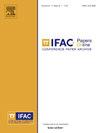Mathematical Modeling of Photosynthetic Eukaryotic Microorganisms Using Metabolic Networks
Q3 Engineering
引用次数: 0
Abstract
Metabolic modeling is a powerful tool for understanding microbial metabolism and is particularly appealing to a wide range of applications, from biotechnology and medicine to environmental science and sustainability. In that context, the elaboration of metabolic networks is essential despite the challenges underlying their reconstruction. While the development of genome-scale networks is computationally costly, small networks are often oversimplified, limiting their use in industrial applications. For this purpose, this paper suggests a method to identify metabolic networks of intermediate size by combining biological knowledge and a series of constraint-based methods in an iterative strategy allowing the refinement of the network definition. The present study focuses on the mathematical modeling of photosynthetic eukaryotic organisms and leads to a detailed network including energy aspects such as the proton motive force. The procedure is effective, yielding promising results while metabolic analyses provide consistent predictive capabilities of the network, in concordance with existing studies.
利用代谢网络建立光合作用真核微生物的数学模型
代谢建模是理解微生物代谢的有力工具,特别具有广泛的应用吸引力,从生物技术和医学到环境科学和可持续性。在这种情况下,代谢网络的阐述是必不可少的,尽管它们的重建面临着挑战。虽然基因组规模网络的开发在计算上是昂贵的,但小型网络往往过于简化,限制了它们在工业应用中的使用。为此,本文提出了一种识别中等规模代谢网络的方法,该方法将生物学知识和一系列基于约束的方法结合起来,采用迭代策略,允许对网络定义进行细化。本研究的重点是光合真核生物的数学建模,并导致一个详细的网络,包括能量方面,如质子动力。该程序是有效的,产生了有希望的结果,而代谢分析提供了一致的网络预测能力,与现有研究一致。
本文章由计算机程序翻译,如有差异,请以英文原文为准。
求助全文
约1分钟内获得全文
求助全文
来源期刊

IFAC-PapersOnLine
Engineering-Control and Systems Engineering
CiteScore
1.70
自引率
0.00%
发文量
1122
期刊介绍:
All papers from IFAC meetings are published, in partnership with Elsevier, the IFAC Publisher, in theIFAC-PapersOnLine proceedings series hosted at the ScienceDirect web service. This series includes papers previously published in the IFAC website.The main features of the IFAC-PapersOnLine series are: -Online archive including papers from IFAC Symposia, Congresses, Conferences, and most Workshops. -All papers accepted at the meeting are published in PDF format - searchable and citable. -All papers published on the web site can be cited using the IFAC PapersOnLine ISSN and the individual paper DOI (Digital Object Identifier). The site is Open Access in nature - no charge is made to individuals for reading or downloading. Copyright of all papers belongs to IFAC and must be referenced if derivative journal papers are produced from the conference papers. All papers published in IFAC-PapersOnLine have undergone a peer review selection process according to the IFAC rules.
 求助内容:
求助内容: 应助结果提醒方式:
应助结果提醒方式:


